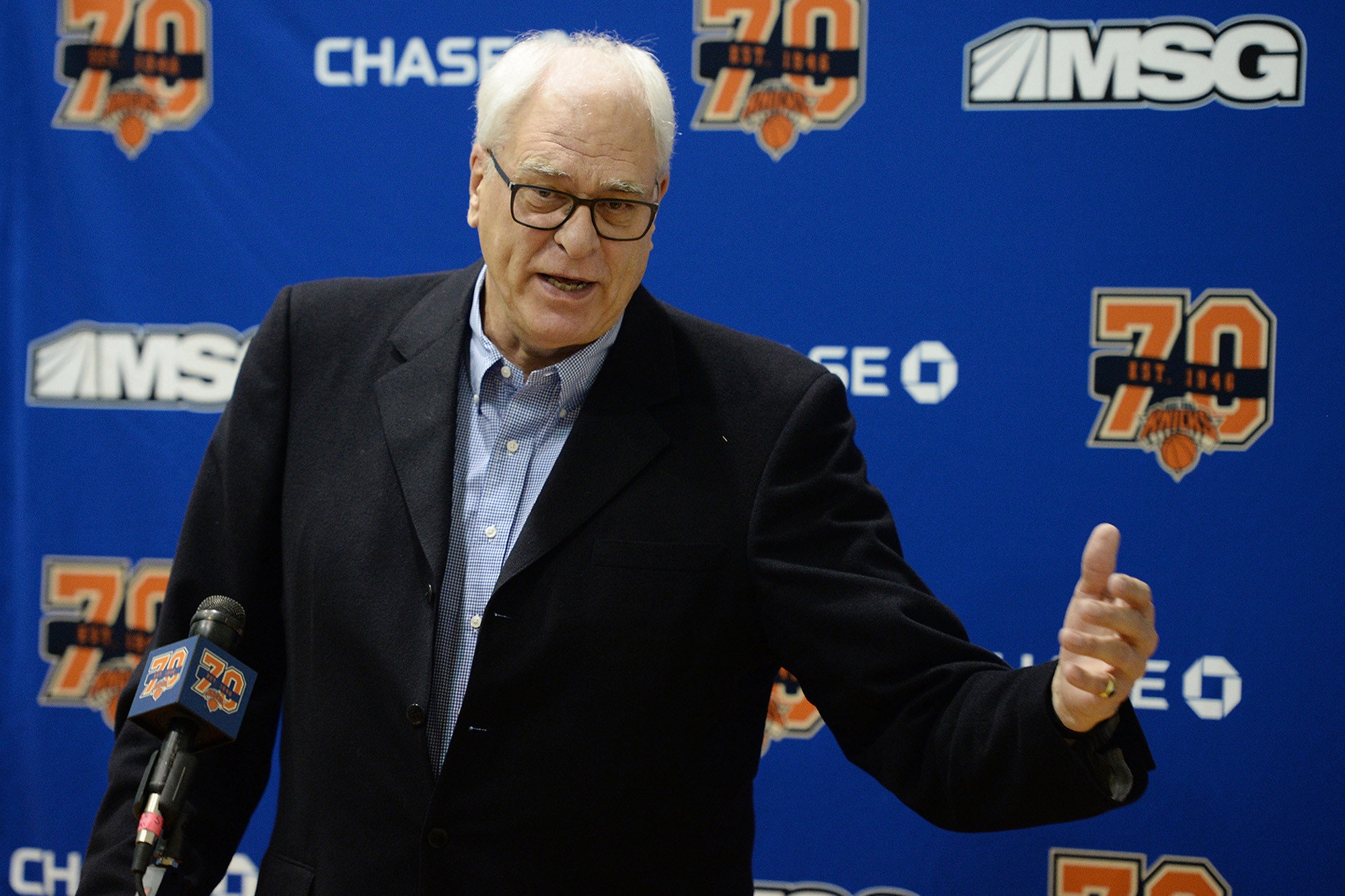More On: carmelo anthony
Carmelo Anthony teaming up with LeBron James, Lakers
Lasting image of Knicks’ last playoff series still haunts Mike Woodson
Julius Randle just had one of the best seasons in Knicks history
Phil Jackson dishes blame around for his Knicks failure
Phil Jackson, who was fired as Knicks president four years ago, opened up on why his leadership tenure in New York was a flop. The 75-year-old, who won 11 championships as a coach, took some blame
Phil Jackson, who was fired as Knicks president four years ago, opened up on why his leadership tenure in New York was a flop.
The 75-year-old, who won 11 championships as a coach, took some blame for the Knicks’ failure but also assigned a lot of it to the media, Carmelo Anthony and the fans.
Jackson said he was grateful when June 28, 2017, arrived, the day Dolan fired him with around $24 million remaining on his five-year contract.
“It was best to leave, and I think as a favor, [James] Dolan relieved me of the job,” said a candid Jackson on Thursday’s “The Curious Leader” podcast, hosted by former Lakers player Cody Karl in Part 1 of a two-part conversation. “I think he actually did me a favor.”
The Zen Master — introduced to run the Knicks on March 28, 2014 — also said the feud with Anthony was the reason Dolan decided to let him go, adding that he was upset with what he believed was unfair treatment by an anti-Knicks media.
“[The media] was decidedly against the organization, and they were looking for whatever they can do to throw aspersions,” said Jackson, who also compared his press treatment to the type President Donald Trump received during his time in office. “I kind of understand Trump had to live with probably for his first 3 ½ years in office with the media.”
Jackson said he regretted not being able to turn around the Knicks, but also took a swipe at the fan base.

“It felt like a major disappointment to have to go through that and not being able to turn that thing around because it’s a heartbeat of New York,” he said. “It’s a big part of what they like — their basketball team. There are long devoted Knick fans and I appreciate their desire, but I think they get in the way of the team a lot of times.”
As for Anthony, Jackson said he wasn’t able to be the leader the Knicks needed and that his strong personality proved “intimidating” for Derek Fisher, Kurt Rambis and Jeff Hornacek, the team’s coaches during Jackson’s tenure.
“Carmelo, I think, wanted to be a leader, but I don’t think he completely knew how to be a leader as a player,” Jackson said. “And I think that the strength of his personality was intimidating to some of the coaches that were asked to coach the team. And so there wasn’t this compliance that has to go between players and coaches.”
Jackson, who signed Anthony to a five-year contract with a no-trade clause, had a change of heart, but the Knicks star didn’t buy into the idea of being traded until after Jackson’s firing.
“I wanted to trade Carmelo and … he’s got a no-trade clause that they asked for, but I suggested that if there was a situation — and I asked them to trade, I wanted them to be compliant with it,” Jackson said. “And you can have all your choices that you want but I want you to go along with the idea that maybe when your time has come with being with the Knicks. So that was met without compliance.”
Jackson, who didn’t delve into Kristaps Porzingis’ time with the Knicks in Part 1 of the podcast, blamed the media for how he was treated in the feud he had with Anthony.
The legendary coach brought up the reaction to a tweet he said that he “learned you don’t change a spot on a leopard.” It was in reference to Michael Graham, a former Georgetown player Jackson coached in the Continental Basketball Association that he couldn’t reach, which many also took to be a shot at Anthony.
Current Knicks president Leon Rose, Anthony’s agent at the time, was not happy with the tweet and many took it as a dig at Anthony’s ability to succeed in the triangle offense, as Michael Jordan and Kobe Bryant had.
Jackson said he wasn’t comparing Anthony to the two NBA legends, saying he thought “the offense can work for him, but he’s not that type of player,” adding “you don’t change a player to fit a mold.”
Jackson also referenced the Derek Fisher-Matt Barnes love triangle incident as the time he knew his first Knicks coaching hire wasn’t going to pan out.
Fisher had flown across the country during training camp and was punched in the face by Barnes for being with his ex-fiancée and was fired by the Knicks three months after the blowup.
“Derek Fisher, I thought, was one of my top leaders of the Lakers team and a guy who understood the relationship of players to a game and offensively how the [triangle] system plays,” Jackson said. “He was himself caught up in a personal situation. It was a distraction. And at best, undermined his authority with the team.”
After firing Fisher, Jackson hired Rambis, another triangle expert and liaison, to coach the team but that move failed, too.
“Perhaps the best thing I could’ve done was just coach the team myself. But I wasn’t physically able to do that,” said Jackson, who was dealing with health issues. “I had to convey that through people, I chose to step in. It didn’t seem to work out. And as a consequence I thought we had the talent but we never found that niche, that ability to just play beyond talent and play concise, connected, organized basketball.”
This story originally appeared on: NyPost - Author:Ted Holmlund






















